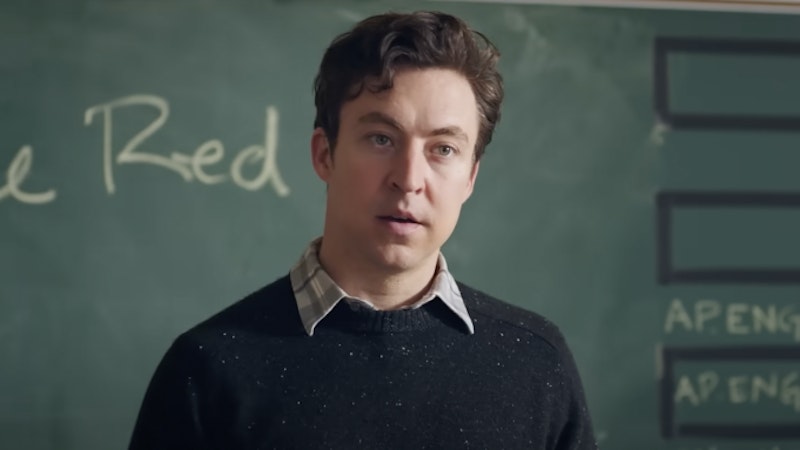It’s odd there’s been so little narrative-based media about teaching as a profession. This is undoubtedly because criticism of curriculum and student behavior is far easier to make if the teachers aren’t treated as individuals, with the exception of disgraced outliers that are taken as broad generalizations of the entire vocation. It's also harder to completely infantilize the plight of today’s youth if it's also recognized that their instructors have the same frustrations within standardized education as their students; no teacher has ever wanted to spend more time with little freedom to make less money.
FX’s English Teacher is an underdog story cultivated from the most contentious issues that face public education today. Brian Jordan Alvarez developed, wrote, and starred in the series as Evan Marquez, an English teacher at a densely populated high school in Texas. Evan’s district isn’t wealthy enough to give him a salary boost, but the financial disparity is significant to the point that privileged parents seek to hold him accountable for any dips in the performance of their children. Evan’s also responsible for the discipline of English, a subject that’s under increased fire given the frequent complaints made about such supposedly “objectionable” content as 1984, The Great Gatsby, and The Adventures of Tom Sawyer.
This alone may have made Evan a compelling protagonist, but it's not just professional inequities that put him in the midst of a crossfire; he’s also an openly gay man whose identity is taken to be a crime by some members of his community. Alvarez doesn’t turn Evan into a self-righteous protestor who’s willing to burn bridges for the sake of a moral victory, but he’s also uncomfortable about the denial of his lifestyle. Evan’s avoided public shaming, but the thinly-veiled threats made against him upon any hints of his life outside of the classroom indicate the pressure he’s under. Even Evan’s colleagues, who are largely respectful towards him, passively suggest that he’s never going to be entirely out of harm’s way.
Evan’s battle against the discrimination leveled towards him could’ve been the entire focus of English Teacher, but the show’s still pitched as a weekly sitcom with situational escapades. There’s enough annoyances involved in the everyday responsibilities of high school English to justify some fun storylines; between being the director of an extracurricular study club, an uncomfortable chaperone job on a class trip, and a school representative at an academic conference, Evan’s forced to be reluctantly confrontational. The show’s best episode, “School Safety,” is an encapsulation of the ongoing debate about guns in classrooms; when the politically-infused talking points are set aside, Evan has a strong objection to the notion that he should be prepared for the increased likelihood that one of his students is an active threat.
There’s a good chance that English Teacher would’ve reflected the grievances felt by anyone with first-hand education system if it had stuck to the “problem of the week” formula; even those that never graduated from high school could relate to the plight of someone like Evan, who’s forced to defend and honor district-wide policies that he had no say in. However, the most compelling insight that English Teacher has on 21st-century learning is Evan’s seemingly straightforward insistence that teaching’s an art, and not a science. Lessons should be tailored to students’ interests and needs, not used as an outline to ace standardized testing; books should be taught based on what they have to say, and not because they should be marked off of a checklist. Evan’s challenge is that he’s constantly at odds with those who seek to judge him without any sign of interest in what has made him unique; he’s told how he should teach by those who’ve never led a classroom, and he’s warned to mask his identity by people who are unusually curious about the way he’s conducted his personal affairs.
The sentiment embraced by educational distinct authorities is that Evan’s private behavior should be entirely divorced from his classroom conduct; beyond the fact that this would make him a less interesting teacher, it’s also an unfair burden, considering that he’s constantly tasked with ensuring that his students can handle the overwhelming pressure of being young, confused, and ignored. It’s a situation made more strenuous because he’s pretty great at his job; while the idea of being an influential figure within his pupils’ lives would be a dream for most teachers, Evan’s resistant to the concept of being considered a role model.
Although it’s so far managed to carefully tackle some potentially incendiary topics, the most bold aspect of English Teacher is its optimism. The show’s faith that minds can change may seem inauthentic to those with more cynical attitudes, but the series had laid out a compelling outline for how to make progress. English Teacher has occupied a strange place within the current market of television comedy. It’s been an era in which comedies are either avant-garde experimental filmmaking (The Bear, Barry, What We Do In The Shadows) or old-fashioned “feel good” shows (Abbot Elementary, Schitt’s Creek, Shrinking). English Teacher is character-oriented and often articulate, but it's not a piece of outsider art. Even if the character of Evan has considered himself to be an outsider, Alvarez has recognized that his experience is universal.

